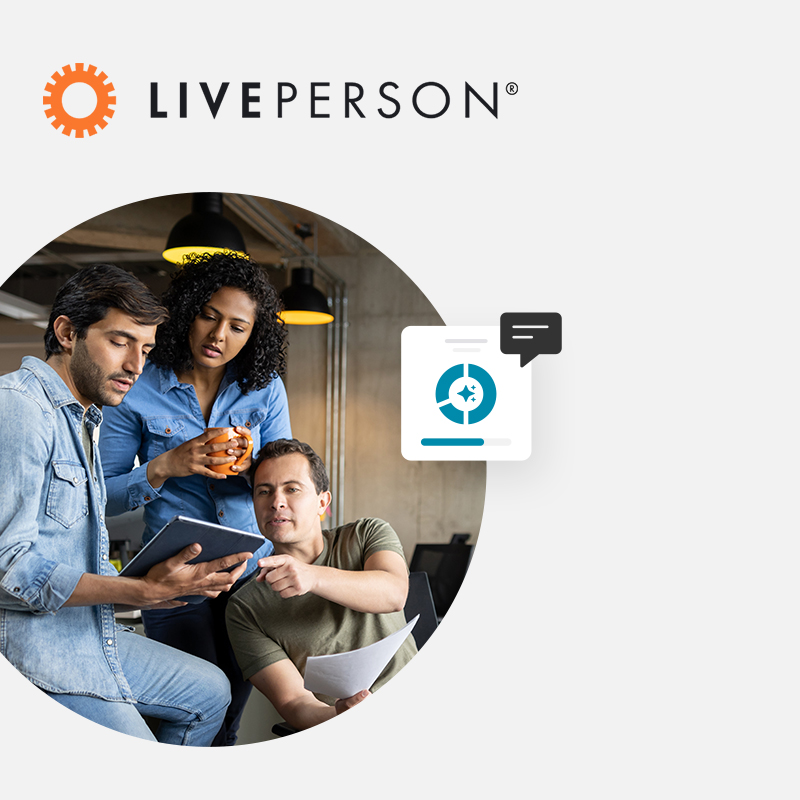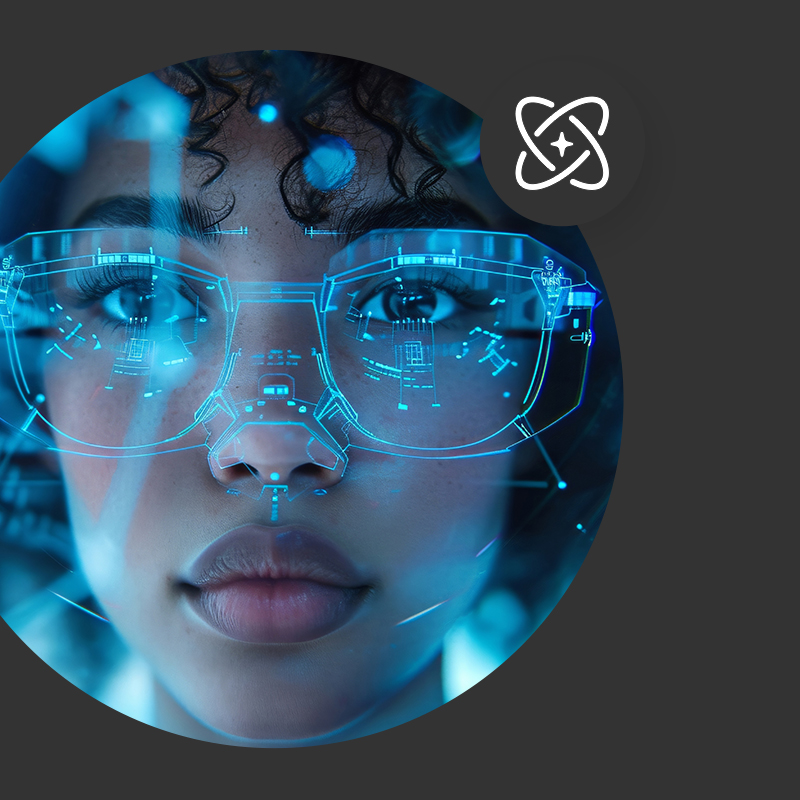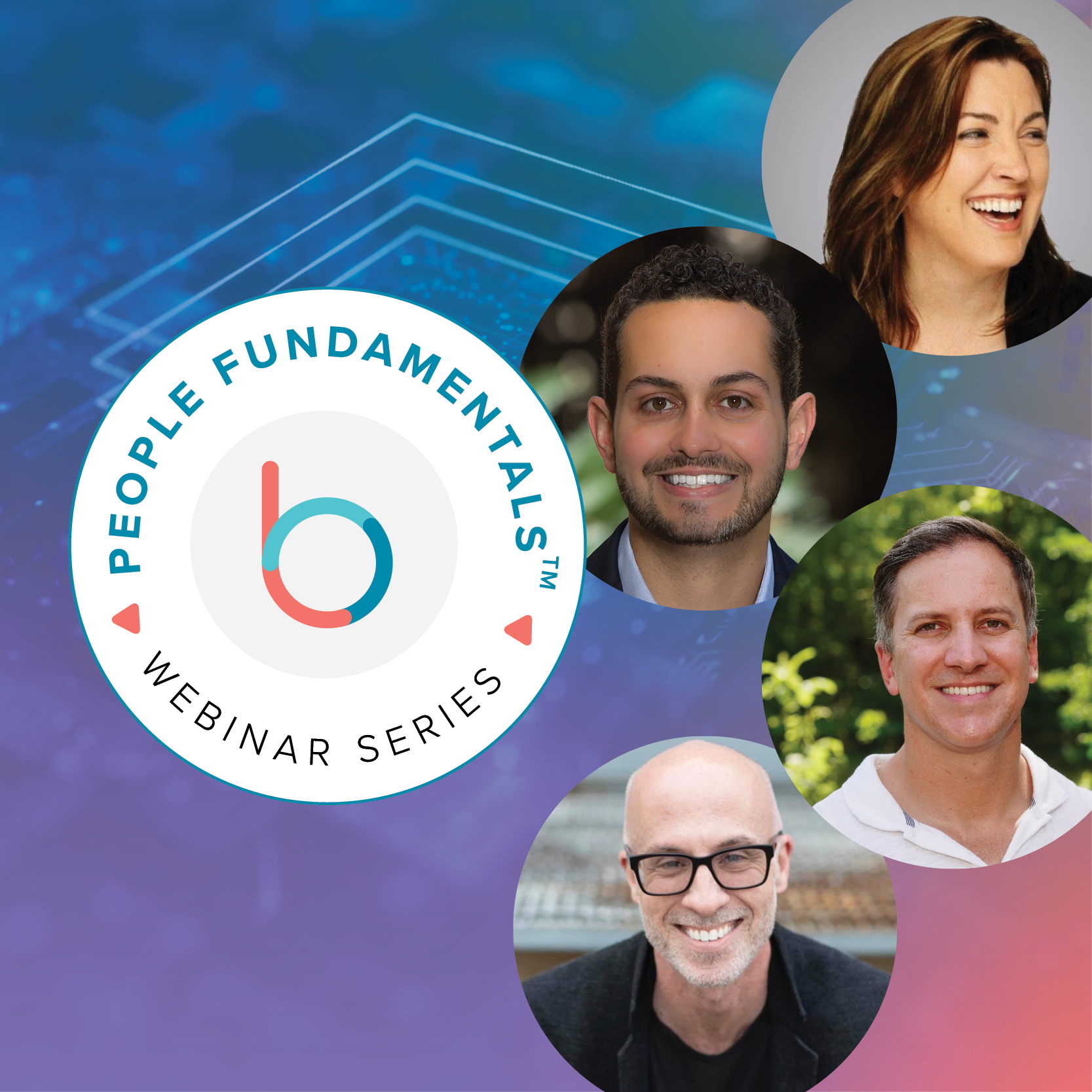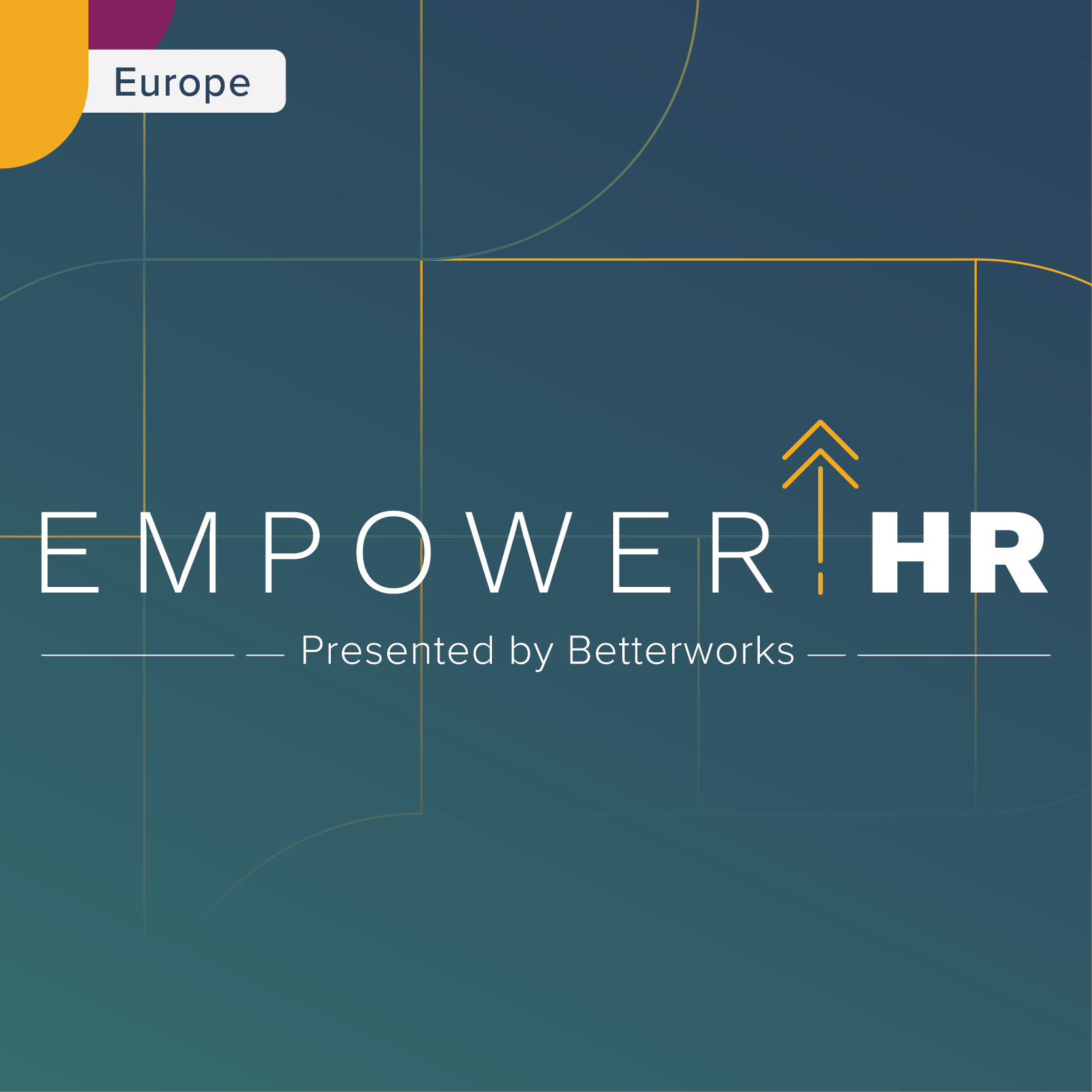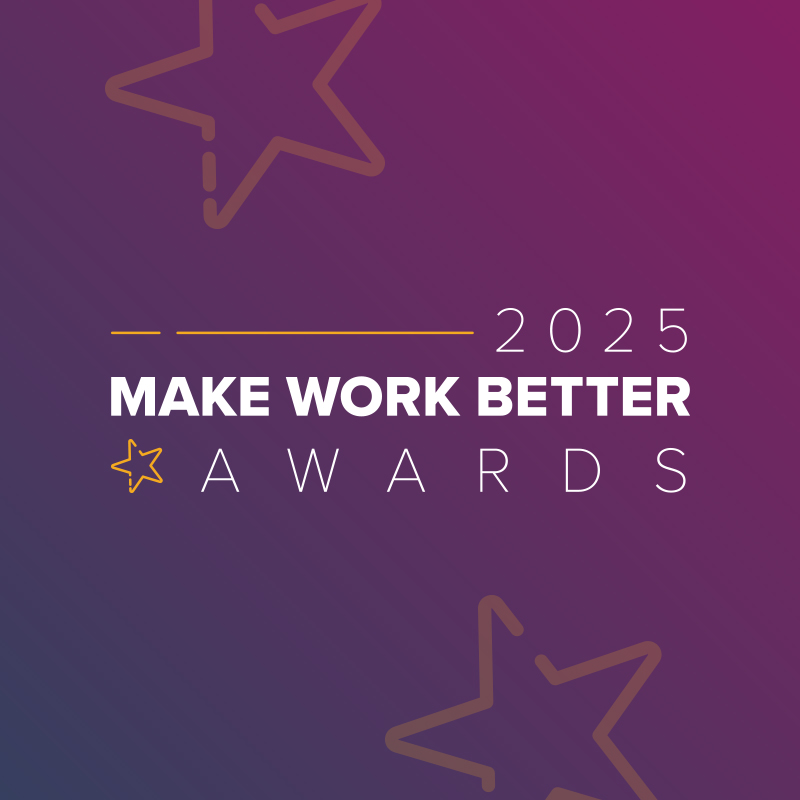Performance management is a double-edged sword: essential for employee growth but often time-consuming and resource-intensive. Managers, tasked with balancing performance evaluations alongside their own responsibilities, frequently struggle to deliver high-impact feedback and guidance. These challenges highlight a pressing need for innovation — and artificial intelligence (AI) in performance management is stepping in to fill the gap.
Research from our 2024 State of Performance Enablement report found that 2 in 3 managers need more support to effectively manage performance, and 35% are already leveraging AI tools to enhance efficiency and effectiveness. By automating routine tasks, removing bias, and surfacing actionable insights, AI empowers managers to shift their focus from administrative burdens to meaningful coaching and personalized development plans, unlocking greater value for their teams and the organization.
Traditional performance management systems can be painstaking and time-consuming, says Cheryl Johnson, chief product and technology officer at Betterworks. “Incorporating AI, particularly generative AI, into performance management,” she says, “can relieve this burden from managers, offer deeper, objective insights into past employee performance, remove the bias from the calibration process, and inform career growth and skill-building.”
AI in performance management is more than a technological advancement. Learn how to harness AI to empower managers, enhance employee development, and drive organizational success.
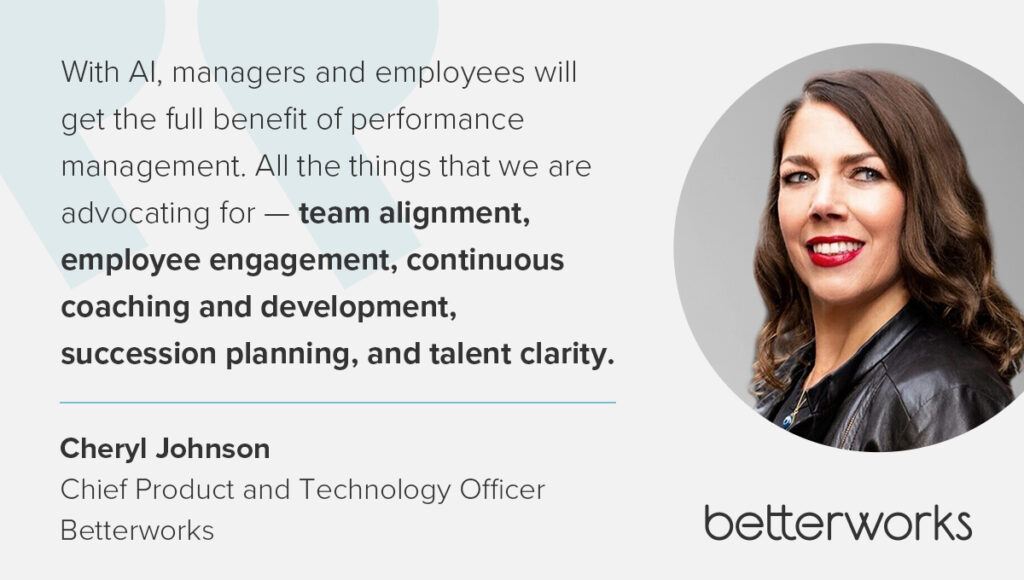
AI’s role in modern performance management
AI is transforming performance management into a more dynamic and high-impact process. While traditional methods often rely on manual tracking and subjective insights, AI-driven solutions offer a data-backed approach to understanding employee performance in real time.
Generative AI (GenAI), in particular, has the potential to revolutionize how HR leaders and managers can streamline, automate, and enhance HR processes. Yet much of that potential remains untapped, with only 16% of HR leaders planning to implement GenAI to support employee feedback and performance management, according to Gartner’s AI in HR: A Guide to Implementing AI in Your HR Organization.
At Betterworks, for example, we’ve integrated AI into the performance review process to help you overcome common challenges like bias, inefficiency, and lack of engagement. By leveraging AI-driven insights, Betterworks empowers managers and employees to focus on what truly matters — development and collaboration. For example, AI can identify patterns and provide recommendations for goal alignment, coaching opportunities, and performance improvements, all within the flow of work.
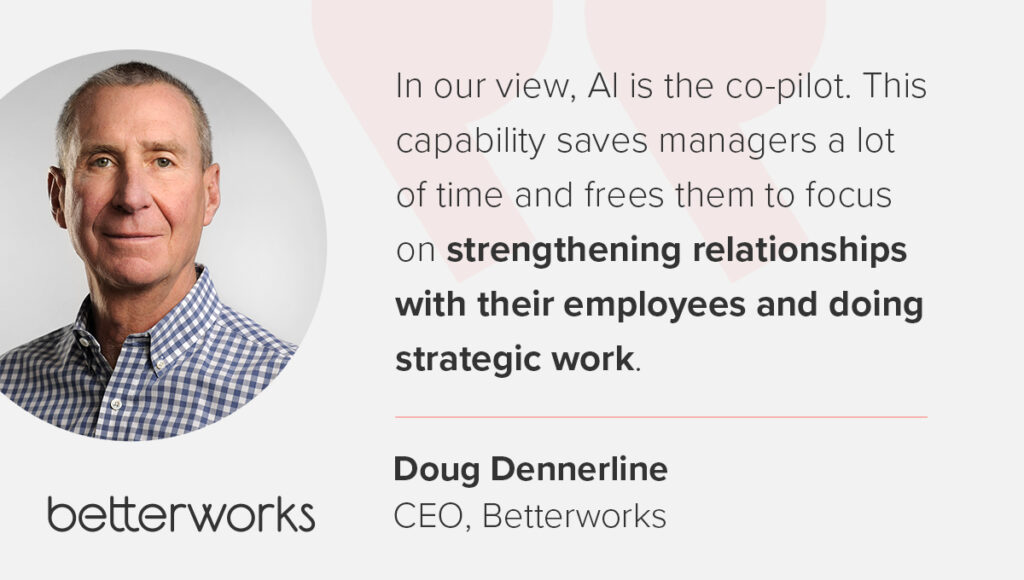
“With AI, managers and employees will get the full benefit of performance management,” Cheryl says. “All the things that we are advocating for — team alignment, employee engagement, continuous coaching and development, succession planning, and talent clarity.”
Instead of replacing human decision-making, Betterworks’ AI works alongside users, supporting managers with intelligent suggestions, delivering comprehensive summaries of feedback, and enabling employees to craft meaningful goals that align with broader organizational objectives. “In our view, AI is the co-pilot,” says Doug Dennerline, CEO of Betterworks. “This capability saves managers a lot of time and frees them to focus on strengthening relationships with their employees and doing strategic work.” This ensures that every performance conversation is backed by data while still retaining the human touch.
From setting objectives to delivering feedback, AI-powered tools like those from Betterworks are designed to simplify and scale processes, allowing you to create a culture of continuous growth and development. By making performance management more precise and actionable, AI helps organizations foster better alignment, engagement, and overall productivity.
3 use cases for AI in performance management
AI has great potential for HR leaders, but like any technology, it’s most effective when applied thoughtfully. Here are three areas where we expect GenAI to influence performance management.
Providing better feedback
Fair, effective, and actionable feedback is essential to a great employee experience and better performance. According to Betterworks’ 2024 State of Performance Enablement report, 20% of employees don’t get regular conversations with their managers and 2 in 5 receive no peer feedback.
Managers can struggle with feedback for many reasons, including insufficient training, time, or resources. In fact, this research revealed that nearly a quarter of managers say they have fewer 1:1s with direct reports and 17% spend less time on providing qualitative feedback.
AI in performance management eliminates the pain and second-guessing associated with delivering candid, supportive, and action-oriented feedback.
“Feedback is riddled with bias,” Doug says. ”Most of us are not psychologists. We don’t necessarily know what motivates or demotivates our people. With data and GenAI, we can remove the bias, remove the opinions, and actually give employees actionable feedback.”
AI-powered performance management processes collect data from multiple sources for a fuller and unbiased individual performance summary. Within Slack or Microsoft Teams, for example, AI tools can recognize when conversations include feedback or recognition and pull that interaction into the performance management platform to provide actionable suggestions that are personalized for each employee.
Betterworks’ Feedback Assist, for example, takes user feedback in any form and provides leaders with personalized, constructive, and unbiased feedback for employees, leading to greater trust, focused career pathing, and better outcomes. Feedback Summary streamlines the review process by condensing feedback, identifying critical themes, and pinpointing strengths and areas for development. This saves time for managers and enhances their ability to coach effectively.
LivePerson, a Betterworks customer, has adopted Feedback Assist and Feedback Summary to speed and simplify its managers’ feedback, allowing managers to scale. “It takes five minutes to do quality stakeholder feedback, which is important,” explains Matthew Meech, talent development manager at LivePerson. “Some of our leaders get 20 or 30 because they work cross-functionally, and they need to be able to deliver that feedback.” Using Feedback Summary, managers have been able to reduce the amount of time it took managers to complete performance reviews by 50%-75%.
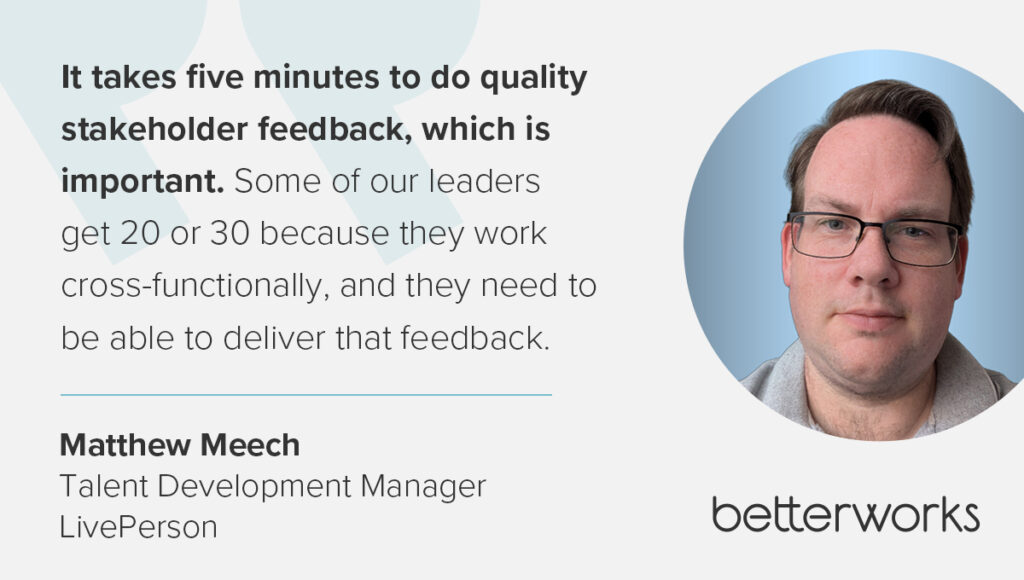
Facilitating ongoing conversations
Managers are busy, often serving as individual contributors in addition to being team leaders. They can struggle to find the time for ongoing, meaningful conversations with their team members, much less know what to focus on in individual conversations.
Betterworks facilitates ongoing conversations by equipping managers with AI-driven conversation prompts tailored to an employee’s goals, past performance, and feedback history. These intelligent suggestions provide managers with specific talking points, making it easier to engage in meaningful discussions that drive alignment and growth. This capability not only saves time but also ensures every interaction contributes to continuous performance improvement.
Developing powerful goals
Setting the right goals can be challenging for employees. Personal goals should align with the goals of the worker’s team, department, and overall business. They should leverage each team member’s unique skills and abilities, strike the right balance between achievability and ambition, and provide a pathway for skill development. The best employee goals are stretch goals, which include practice in the skills employees need to achieve their career aspirations.
Betterworks’ Goal Assist uses AI to help employees and managers create personalized performance goals that align with broader organizational objectives. By analyzing an employee’s role, responsibilities, past goals, and career aspirations, alongside team and organizational priorities, Goal Assist provides tailored recommendations that make goals more relevant and actionable.
This personalized approach doesn’t end at goal-setting; Betterworks also integrates performance reviews into the process. Employees and managers can track progress toward goals and incorporate feedback seamlessly into performance evaluations. This ensures that goals remain central to the review process, fostering a culture of accountability and continuous improvement.
LivePerson has begun using Betterworks Goal Assist, and has already seen an impact. “My experience is that employees don’t always know how to create a performance goal that is meaningful to them or the organization,” says Deanna LaPierre, senior director of talent development at LivePerson. “Goal Assist helps the employee by looking across a broader set of goals like a manager’s goal, top-level goals, and the employee’s job title, and suggests meaningful goals that are specific to the individual employee. It is pretty clear to see that employees who used Goal Assist had a higher level of quality than those who didn’t.”
5 benefits of AI-driven performance management
The primary role of AI in performance management is to increase manager effectiveness so that managers can transform simple employee interactions into powerful drivers of business impact. Here are a few of the benefits of using AI to support better performance management.
Reduced risk of recency bias and other biases
Human biases can skew a manager’s perception of performance. When giving a performance evaluation, recency bias can prompt managers to place more emphasis on recent events, good or bad. If an employee recently struggled with deadlines, for example, their manager may give them a more negative review—even if their overall performance track record was outstanding.
AI can help managers combat unintended recency bias in conversations and feedback by making it easy to refer to historical employee performance data. “Managers are not going to miss those things that might have been captured already or captured six months ago because it’s all there for them,” Cheryl says.
By providing a comprehensive view of an employee’s accomplishments, skills, and capabilities,
AI also helps guard against other unconscious biases, such as affinity bias and the “halo and horns effect,” that can affect performance reviews and calibrations.
Improved employee productivity
Performance feedback is most useful when delivered in the flow of work, giving employees the chance to apply it in real time. However, managers often struggle to deliver real-time employee feedback, especially in remote and hybrid settings, when they may not have as much visibility into performance.
Augmenting performance management with AI can increase employee productivity by facilitating personalized feedback and performance insights — all in the flow of work. GenAI-powered performance reviews can help managers deliver better feedback more consistently, while employees get sound advice they can immediately implement for better outcomes.
Increased fairness and objectivity
Fairness is a key element of a great employee experience. In fact, fairness was the most important workplace quality for respondents in our 2024 State of Performance Enablement report — ahead of characteristics including good work culture, flexibility, and growth. AI helps managers and peers leverage feedback given across time and place for a more complete and objective picture of employee performance. This reduces the likelihood of subjective judgments because managers are relying on data-driven feedback and documented conversations.
Higher-quality human relationships
One of the greatest benefits of implementing AI at work is its ability to make work more human. Applying AI in performance management can streamline or automate administrative and time-consuming tasks for managers, creating more time for meaningful conversations and coaching that keep employees engaged, productive, and performing at their highest level.
Greater organizational success
Because AI helps organizations improve their performance management through data-driven insights, your managers can make better judgments about coaching employees to improve and develop their strengths. This can ultimately lead to increased organizational success, as employees are focused on the areas with the biggest payoff and deliver better outputs for the business.
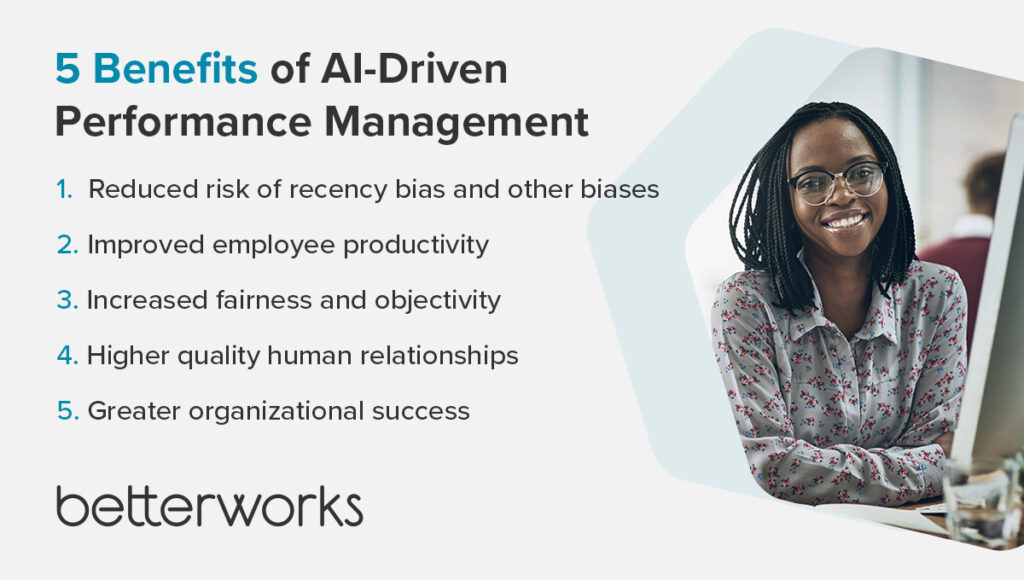
How to implement AI technology responsibly
Like any use of AI in the workplace, companies must be sure to protect data privacy, be transparent about their use of the technology, and deploy appropriate safeguards to detect, prevent, and mitigate bias.
Start by looking at the foundation models used by the vendors of whatever AI tech you’re relying on. Find a technology partner who can demonstrate transparency and show how they’re prioritizing data privacy and security. Vendors who have developed their own private large language model, like Betterworks, are able to ensure the highest standard of security and compliance
Users also have a responsibility to use AI tools safely, ethically, and responsibly. When using AI in performance management, that onus falls on HR leaders and people managers.
GenAI is often more relatable than other types of AI because it can create new content from existing outputs. It’s not human, but the way it responds in real-time to prompts makes it feel like it is. This relatability makes GenAI easier to use but also increases the risk of people becoming too trusting of its outputs.
“That’s what makes it really such a leap, and so powerful and useful — but that’s also where the risk comes in because essentially there’s a creative element to the large language model,” Cheryl explains. “Every enterprise, as their folks are adopting this technology in novel ways, needs to make sure everyone understands that risk.”
At the same time, you can’t take GenAI’s output at face value. You want to keep a human in the loop to verify its accuracy, especially given the occurrence of “AI hallucinations.” Private LLMs can significantly reduce hallucinations, but at this point in time, it is impossible to completely eliminate them.
Applying AI in performance management
GenAI presents a powerful opportunity to improve performance management outcomes for employees, managers, HR leaders, and organizations.
AI can help your managers unlock the performance potential of your workforce by streamlining tasks, summarizing key information, and freeing up time for one-on-one interactions. When you understand how to thoughtfully implement AI, you can enter a new era of transformational performance management.
Want to learn more? Explore 3 Ways AI Transforms Work According to HR Leaders.
HR Leaders: Unite, Learn, Drive Change

